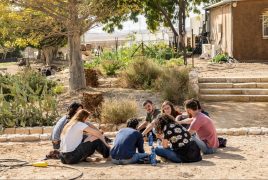
It is hard to conceive of many silver linings of the current pandemic. According to Johns Hopkins University’s Coronavirus Resource Center, as of Saturday, May 23, the coronavirus has infected over five million people and claimed over three hundred thousand lives worldwide. Like the majority of the world, confined in our homes in Amman, Tel Aviv, Ramallah, New York City, Johannesburg, Paris, and Santiago among many other cities, we, the Arava Institute’s alumni, turned to the internet to connect, share, care, and learn together, from each other, over a series of alumni-led Zoom sessions. Given the vast geographic spread of our community, organizing in-person meetups, which before this pandemic, would happen multiple times a year, was often both expensive and logistically arduous. Palestinians needed permits, and Jordanians required visas to enter Israeli territory, while our international alumni, primarily based in North America, were an expensive flight and many hours away, prompting us to divide alumni activities in between the US and the Middle East.
It is remarkable how this transition to this new virtual world came very naturally to us. Right as governments world-wide began issuing stay-at-home orders around mid-March, our alumni took initiative and organized regular weekly sessions, sometimes even multiple times a week. The topics of these sessions have reflected the very diverse and wide-ranging interests of our community. From learning creative storytelling techniques to developing GIS maps and applying them to understand environmental challenges to taking a deep dive into the world of sustainable fashion to sharing sound strategies of personal finance, learning Arabic, artistic- co-creation and even a virtual dance party, our list of topics is virtually unlimited and will continue to grow.
We realized, right from the start of it all, that as the world drastically changes around us, this will lead to accelerating fundamental changes to the nature and culture of work, education, and social relations. More and more people will work or study remotely, from home, a cafe or a co-working space, or even while laying down on the beach or sitting under a tree in the park. What makes our alumni community inherently adaptive to this profound transition is its small size and geographic spread. Many similar educational institutions have similarly vast geographic spread, but our small size, ethos, and raison d’être make us uniquely intimate, nimble, and able to reach out and include everyone who wants to take part in our activities.
This is certainly not to say that we aren’t eagerly looking forward to the day in which we could go back to organizing our in-person meetups. The virtual space, while it enables us to bridge distances and transcend political borders, is not a sufficient substitute for our physical intimate circles of learning and growth that we have built together over the years. But the silver lining of this impending seismic societal shift lies in our realization that – now we were forced to take nearly all of our lives online, even briefly – we have a tremendous opportunity to build upon and complement our physical meetups, in all corners of the globe, with more and more virtual follow-up discussions, study-sessions, and well, dance parties!
Submitted by Mohammad Azraq, 2010-11 alumnus

